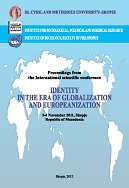POLITICAL IDENTITY AND RESPECT OF POLITICAL DIFFERENCES
POLITICAL IDENTITY AND RESPECT OF POLITICAL DIFFERENCES
Author(s): Nazmi MalichiSubject(s): Politics / Political Sciences
Published by: Институт за социолошки и политичко-правни истражувања
Keywords: political tolerance; differences; recognition; political culture; identities
Summary/Abstract: Political tolerance is regarded as a part of the concept of recognition that allows the existence of differences between people who are careerists/creators of policy/policy makers. It is these differences and their recognition that are the main source of tolerance. Consequently, there is no tolerance without recognizing the right of these differences. But, on the other hand, the recognition itself of the right of differences between people opens numerous questions and difficulties about the functioning of tolerance. Do functional or populist politics dominate? Are common cultural values to be nurtured and preserved in the state exactly/accurately defined? With regret we can conclude that within the official, politicized and party culture, we build an authoritarian culture that creates an environment to make/making citizens live in fear of identity preservation, rather than promoting projects that will help them live with the political reality. Today, educational system and ethics-related education must become a necessary conception as an essential concept of ethical virtue. More should be invested in young people’s lives in order to create ethical and tolerant beings. If we are supporters of democracy and more specifically the values of liberal democracy, we should accept the fact that every citizen has the right to defend its system of national, religious and all other values. This often creates relations of conflict, complicating or generating implications on the existing values as a result of conflicts. In such circumstances, it seems that misunderstandings occur as a result of different ideas and preconceptions about myths or mythology, rise of national myths of the past, when people make attempts to expose their ideas in a way that leaves the impression that they conform to part of the historians or politicians, but without any significance for the present and future. If they insist/intend to build the future of a nation in present time, relying purely on mythology, one can suspect that there is something wrong in that nation and its political elites. It might be regarded as an indicator of their attempts relating to the intended method of how to build the future or, more accurately, national, cultural, political, economic prospects of the country. To avoid building the idea of myths, in fact, it is better to follow a different direction. Namely, it would be more sensible to explore the values and gain a deeper insight, thereby trying to identify their implications for the present situation. The attempt to find space for hope in the current time is a kind of intellectual challenge for an individual, and in view of this we will seek to build/develop a policy and diplomacy that includes historical events, but at the same time we should have in mind the words of the winner of Nobel prize in literature Camilo Jose Cela: “We should not be on the side of those who make history but on the side of those who suffer in it.”
Journal: Proceedings from the International scientific conference
- Issue Year: 2012
- Issue No: 1
- Page Range: 61-68
- Page Count: 8
- Language: English
- Content File-PDF

